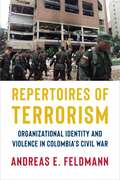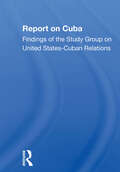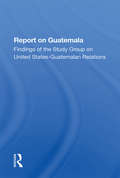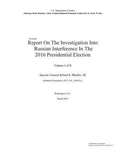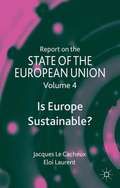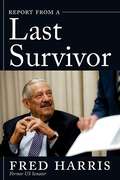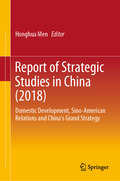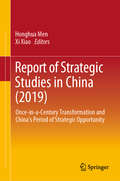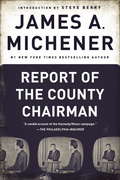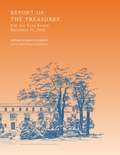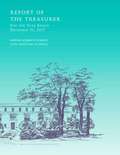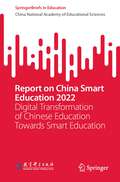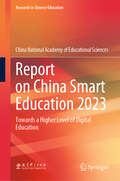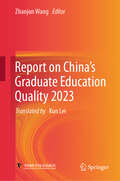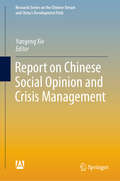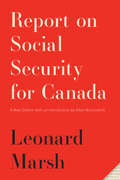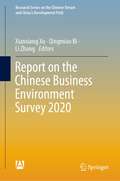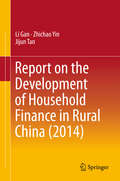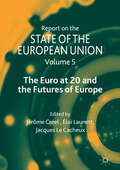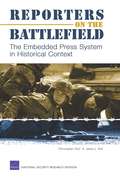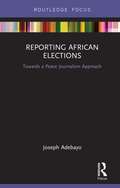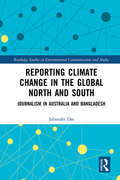- Table View
- List View
Repertoires of Terrorism: Organizational Identity and Violence in Colombia's Civil War (Columbia Studies in Terrorism and Irregular Warfare)
by Andreas E. FeldmannWhy do armed groups employ terrorism in markedly different ways during civil wars? Drawing on more than a decade of fieldwork, Andreas E. Feldmann examines the disparate behavior of actors including guerrilla groups, state security forces, and paramilitaries during Colombia’s long and bloody civil war. Analyzing the varieties of violence in this conflict, he develops a new theory of the dynamics of terrorism in civil wars.Feldmann argues that armed groups’ distinct uses—repertoires—of terrorism arise from their particular organizational identities, the central and enduring attributes that distinguish one faction from other warring parties. He investigates a range of groups that took part in the Colombian conflict over the course of its evolution from ideological to criminal warfare, demonstrating that organizational identity plays a critical role in producing and rationalizing violence. Armed parties employ their unique repertoires as a means of communication to assert their relevance and territorial presence and to differentiate themselves from enemies and rivals. Repertoires of Terrorism is based on an extensive data set covering thousands of incidents, as well as interviews, archival research, and testimony. It sheds new light on both armed groups’ use of violence in Colombia’s civil war and the factors that shape terrorist activity in other conflicts.
Replace the State: How to Change the World When Elections and Protests Fail
by Sasha DavisA practical call to action against oppression Across the globe, millions of people have participated in protests and marches, donated to political groups, or lobbied their representatives with the aim of creating lasting social change, overturning repressive laws, or limiting environmental destruction. Yet very little seems to improve for those affected by rapacious governments. Replace the State brings new hope for social justice movements by looking to progressive campaigns that have found success by unconventional, and more direct, means. Sasha Davis, an activist and scholar of radical environmental advocacy, focuses on the strategies of movements, many of them Indigenous, that have occupied contested sites and demonstrated their effectiveness at managing or governing them. Including case studies of resistance to development on Indigenous lands in Hawai&‘i, nuclear testing in the Nevada desert, and the U.S. military occupation of Okinawa, he offers insight and direction for activists, students, academics, and others dedicated to protecting and improving the well-being of their communities and beyond. It would be easy to succumb to pessimism and political apathy in the face of governing institutions that are increasingly unresponsive to calls for change and repressive in response to protest, even as they violate human rights, ignore existential climate catastrophes, and concentrate power into fewer and fewer hands. Instead, Davis finds inspiration for genuine political change through social movements that are successfully &“replacing the state&” and taking over the day-to-day governance of threatened places. From contesting environmental abuse to reasserting Indigenous sovereignty, these social movements demonstrate how people can collectively wrest control over their communities from oppressive governments and manage them with a more egalitarian ethics of care. Retail e-book files for this title are screen-reader friendly with images accompanied by short alt text and/or extended descriptions.
Report On Cuba: Findings Of The Study Group On United States-Cuba Relations
by Central American and Caribbean ProgramFirst published in 1984. The Study Group on U.S.-Cuban Relations was organized under the auspices of the Central American and Caribbean Program (CACP) at The Johns Hopkins University School of Advanced International Studies (SAIS) in Washington, D.C. The Study Group on U.S.-Cuban Relations met on three separate occasions. The first meeting on January 24 and 25, 1983, was devoted to discussion of U.S.. interests and policy objectives in Cuba. The second meeting on February 28 was dedicated to analysis of the current U.S. policy toward Cuba, and the final session on March 25 focused on policy options. The following report is a synthesis of the three discussions
Report On Guatemala: Findings Of The Study Group On United States-guatemalan Relations
by The Johns Hopkins Foreign Policy Institute, School of Advanced International Studies (SAIS)The findings of the Study Group on United States-Guatemalan Relations,organized under the auspices of the Central American and Caribbean Program(CACP) at the School of Advanced International Studies, The Johns HopkinsUniversity, focus on the nature of Guatemalan politics, possibilities for democratization,and the options available to U.S. policymakers during the regime ofGeneral Rios Montt. Also included in this book are two papers, commissioned by the CACP, that present starkly contrasting views of Guatemala in order to provide a background for the study group's discussions. As anticipated by study group members, the Rios Montt regime fell from power after the initial writing of this report, but their findings nevertheless provide an excellent overview of the debate on U.S. policy toward Guatemala.
Report On The Investigation Into Russian Interference In The 2016 Presidential Election: The Mueller Report
by Special Counsel Robert S. MuellerDPLA is proud to release an enhanced version of the report with improvements, including links to more than 740 of the original documents referenced in footnotes, and format and tagging enhancements to make the document more accessible to those with text impairments. <P><P> To create this enhanced version, DPLA collaborated with the Internet Archive and MuckRock, who provided the links to the footnotes. We discovered that Bill Kasdorf and Thad McIlroy at Publishing Technology Partners had initiated work on a more accessible version and we joined forces. codeMantra implemented the accessibility improvements, and Digital Divide Data provided production support. <P><P> DPLA’s Ebook work and the production of the Mueller Report ebook has been supported by the Alfred P. Sloan Foundation. SimplyE was developed by The New York Public Library. To learn more about Open Bookshelf and other DPLA ebooks offerings, visit ebooks.dp.la.
Report On The State Of The European Union
by Jacques Le Cacheux Eloi LaurentThe Report on the State of the European Union examines the progress of European integration and focuses on economic aspects of the process. This second volume in the series explores the four crises of contemporary Europe, those of growth, trust, inequalities and unity.
Report from a Last Survivor
by Fred HarrisFred Harris is the last surviving member of the Kerner Rights Commission, famously created by President Lyndon Johnson following the terrible riots, disorders, and violent protests that exploded in so many of America&’s cities in the &“long hot summer&” of 1967. He is the last survivor of the 1964 &“Four Back Bench US Senators,&” which consisted of Walter Mondale of Minnesota, Joseph Tydings of Maryland, Fred Harris of Oklahoma, and Robert Kennedy of New York. He is also the senior surviving former member of the US Senate and one of two &“last surviving&” Democratic presidential candidates to run in 1976—the other being President Jimmy Carter Jr.Report from a Last Survivor tells Fred Harris&’s many stories: some serious, some funny, and all true. Each story forms a part of this report of a last survivor, a long look back over ninety-three years and counting of a rich life of public service and personal commitment.
Report of Strategic Studies in China (2018): Domestic Development, Sino-American Relations and China’s Grand Strategy
by Honghua MenThis book is devoted to taking a lead in establishing a multi-disciplinary and inter-disciplinary platform for exchanging fresh thinking in the field of strategic studies. The book gathers invited reports from various prestigious scholars from home and abroad. The aim of this book is threefold: firstly, to provide a comprehensive overview of the emerging evolution in international and regional orders, as well as the recent strategy adjustments among major world powers; secondly, to discuss major strategic issues facing China, and to further propose the Chinese wisdom and a Chinese strategic approach to sustaining peace and development, and to reaching a benign international interaction between China and other entities in the world, such as achieving cooperation and mutual benefits between China and the world; thirdly, to investigate the key factors in enhancing China’s domestic governance such as strengthening state political capacity, national environmental governance, etc. The editorial group selected 10 high-quality reports to disseminate the findings and promote future research collaboration in this area. This timely book offers both theoretical insights and rigorous quantitative method that impact China’s peaceful rise in the international arena.
Report of Strategic Studies in China (2019): Once-in-a-Century Transformation and China’s Period of Strategic Opportunity
by Honghua Men Xi XiaoThis book is devoted to taking a lead in establishing a multi-disciplinary and inter-disciplinary platform for exchanging fresh thinking in the field of strategic studies. The book gathers invited reports from prestigious scholars in such research areas as political philosophy, economy, history, international security and diplomacy. The theme of the book is grand in nature, for the world is undergoing once-in-a-century great transformation, meanwhile China faces the critical moment for its great rejuvenation, how China thinks about and designs its relations with the world is a key issue in the international arena. The book reveals that the greatest challenge to China in this context is how to secure and extend its period of strategic opportunity, and actively shaping this period should be regarded as the core trend of its response. The aim of this book is threefold: firstly, to provide a comprehensive overview of the undergoing world transformation and its interaction with China; to analyze how China deals with internal and external challenges, why China could still have strategic opportunities and what will and should China do to sustain and reshape its period of strategic opportunity, secondly, to analyze how China deals with fierce strategic competition with the U.S., and how it develops its relations with other countries, especially great powers; to analyze the challenges that the BRI faces and how China reshapes it relations with other developing countries via cooperation on the BRI; thirdly, to provide a vivid picture of world transformation and China’s design of its grand strategy, to investigate the key factors in securing China’s sustainable development and its period of strategic opportunity, and indicates that the key is to develop a global vision and provide new strategic opportunities for the world, and the support comes from a stronger presence in the region and an optimized geopolitical and economic environment.The book provides Chinese visions and wisdom on world transformation and strategic opportunities, reveals Chinese wisdoms in dealing with transformation and crises, all readers could learn more if they could keep calm and think.
Report of the County Chairman
by James A. Michener Steve BerryJames A. Michener, the acclaimed author of sweeping historical blockbusters, chronicles his personal involvement in one of the most dramatic elections of the twentieth century: the presidential race between John F. Kennedy and Richard Nixon. A relative newcomer to politics, Michener served as the Democratic chairman in his native Bucks County, Pennsylvania, in a rural battleground precinct where the major controversies of the day--notably Kennedy's Catholicism--brought cultural divides to the forefront. First published shortly after the 1960 election, Report of the County Chairman remains an intimate, gripping account of the power of grassroots political involvement. BONUS: This edition includes an excerpt from James A. Michener's Hawaii.
Report of the Treasurer of the National Academy of Sciences
by National Academy of Sciences of the National AcademiesThis Report of the Treasurer of the National Academy of Sciences presents the financial position and results of operations, as well as a review of the endowment, trust, and other long-term investments pool activities of the Academy for the year ended December 31, 2009.
Report of the Treasurer of the National Academy of Sciences: For the Year Ended December 31, 2016
by National Academy Of SciencesThe income that supports the activities of the National Academy of Sciences (NAS) comes from two major sources: program revenue received from sponsors to pay for the myriad studies and other activities undertaken each year by the National Academies of Sciences, Engineering, and Medicine, and a much smaller sum that is obtained from our endowment under the endowment spending policies adopted by the Council. The goal of the endowment is to provide stable support for the Academy’s programs and activities. To achieve this goal, the Council, acting on the recommendations of the Finance Committee, has historically authorized spending from the portfolio at a rate designed to maintain the purchasing power of the endowment over time. This Report of the Treasurer of the National Academy of Sciences presents the financial position and results of operations as well as a review of the endowment, trust, and other long-term investments portfolio activities of our Academy for the year ended December 31, 2016. While this book provides essential financial summary to key personnel, it also serves as a vital informative resource for various members of the public, private, and governmental sectors.
Report of the Treasurer: For the Year Ended December 31, 2017
by National Academy of SciencesThe income that supports the activities of the National Academy of Sciences (NAS) comes from two major sources: program revenue received from sponsors to pay for the myriad studies and other activities undertaken each year by the National Academies of Sciences, Engineering, and Medicine, and a much smaller sum that is obtained from our endowment under the endowment spending policies adopted by the Council. The goal of the endowment is to provide stable support for the Academy's programs and activities. To achieve this goal, the Council, acting on the recommendations of the Finance Committee, has historically authorized spending from the portfolio at a rate designed to maintain the purchasing power of the endowment over time. This Report of the Treasurer of the National Academy of Sciences presents the financial position and results of operations as well as a review of the endowment, trust, and other long-term investments portfolio activities of our Academy for the year ended December 31, 2017. While this book provides essential financial summary to key personnel, it also serves as a vital informative resource for various members of the public, private, and governmental sectors.
Report on China Smart Education 2022: Digital Transformation of Chinese Education Towards Smart Education (SpringerBriefs in Education)
by China National Academy of Edu., SciencesThis book aims to reflect the digital transformation of Chinese education toward smart education comprehensively and accurately. It is the first systematic summary of the progress of smart education in China. The book believes that smart education is a new education form in the digital era and is essentially distinct from education forms in the industrial era. This new education form is innovative in five dimensions. First is the new core concept. Smart education is not only a concrete action concerning people’s well-being, but also a vital strategy concerning national plans. Through technology empowerment and data drive, it empowers educational reform in all aspects, systematically constructs a new relationship between education and society, provides suitable education for each learner, and makes the aptitude-based teaching that we have been dreaming of for thousands of years a reality. For the first time in history, smart education helps to reach the full alignment between individual development and societal development. Second is the new system structure. Smart education will break through the boundaries of school education, drive the diversified combination of various education types, resources, and elements, promote the collaboration of school, family, and society in education, and build a high-quality, individualized lifelong learning system that is available for anyone anywhere anytime. Third is the new teaching paradigm. Smart education will integrate physical, social, and digital spaces to create new learning scenarios and promote human–technology integration, and cultivate cross-grade, cross-class, and cross-discipline learning communities across time and space to organically combine large-scale education with individualized cultivation. Fourth is the new educational content. Smart education will focus on developing all-round education, establishing digital knowledge graphs based on systematic logics of knowledge points, and innovating content presentation methods to make learning a wonderful experience and help learners develop higher-order thinking skills, comprehensive innovation capability, and lifelong learning ability. Fifth is the new education governance. With data governance at the core and digital intelligence technology as the driver, smart education will boost the holistic reengineering of education administration and business processes and enhance the modernization of the education governance system and governance capacity. This book is intended for teachers, education administrators, education policymakers, education researchers, and parents concerned about education innovation and development, as well as people from all walks of life who have aspirations for the education industry. It can also serve as a reference for international organizations and education research institutions of all countries to promote the joint exploration of the development path of smart education and create a better future for the world’s mutual development through educational reform.
Report on China Smart Education 2023: Towards a Higher Level of Digital Education (Research in Chinese Education)
by China National Academy of Educational SciencesThis book provides a comprehensive overview of the development of smart education in China. It defines smart education as a higher level of digital education that can be divided into four stages, including resource sharing, data-driven, integration with AI, and ecology reshaping. It proposes five practical paths for the development of smart education in China, such as cultivating innovation literacy as its goal and data empowerment as its core, and it develops an evaluation framework consisting of four dimensions, including extensive connectivity, innovative application, mechanism guarantee, and literacy improvement. Finally, it also identifies five trends in the global development of digital education. This book serves as a valuable resource for teachers, education administrators, education researchers, and other readers who are interested in educational innovation and development in China.
Report on China’s Graduate Education Quality 2023
by Zhanjun WangThis book provides an overview of China&’s graduate education quality in 2022 from various aspects and dimensions. It summarizes the overall development of China&’s graduate education quality in 2022, analyzes comprehensive, objective, and multidimensional data related to the development of China&’s graduate education, including provincial quality evaluation of graduate education, the analysis of graduate satisfaction survey, the evaluation for high-level graduate schools, and the views of international media on graduate education in China, and also highlights 10 major events influencing the quality of graduate education. It facilitates readers&’ understanding of the quality of graduate education in China, provides the basis for decision-making for universities and government administrations, and enhances communication with international counterparts. It also serves as a valuable information source for academia in general. The basis of English translation of this book, originally in Chinese, was facilitated by artificial intelligence. The content was later revised by Prof. LEl Kun who has subsequently revised the text further in an endeavor to refine the work stylistically.
Report on Chinese Social Opinion and Crisis Management (Research Series on the Chinese Dream and China’s Development Path)
by Yungeng XieThis volume focuses on Chinese society in the environment created by new media. It offers insights into Chinese public opinion for an international readership, and to promote the media literacy and crisis coping capacity of all social sectors by integrating multiple research perspectives, including journalism and communication, management, sociology, psychology, information security, etc. The volume is guided by an innovative “overarching public opinion research framework” as well as qualitative and quantitative research methods, and includes in-depth studies on: the status quo of Chinese social opinion and Internet public opinion, the developmental history of Chinese Internet public opinion over the past ten years (2003-2012), the online communication of public events, and public satisfaction with the government.
Report on Social Security for Canada: New Edition (Carleton Library Series #244)
by Leonard Marsh Allan MoscovitchReport on Social Security for Canada, written in wartime, presented to Canadians a picture of a better life in the postwar world. It outlined what governments could do to ensure that all citizens could afford the food, clothing, and shelter necessary to participate fully in their community. Authored by Leonard Marsh for the wartime Federal Advisory Committee on Reconstruction, the report was the subject of enormous attention when it was presented to the House of Commons in March 1943. Drawing on the work of his mentor, William Beveridge, and of John Maynard Keynes, Marsh primarily recommended an employment program meant to ensure lower unemployment and higher incomes. His report also discussed family allowances to make certain that no child would go without, health care insurance, temporary assistance in case of illness, a pension plan, and various other social benefits related to maternity, disability, loss of employment, and death. Today Report on Social Security for Canada is seen as a foundational text for the Canadian social security system. In this edition Allan Moscovitch provides the historical context, an outline of Marsh’s accomplishments, and suggestions for how to enhance the welfare state and respond to the social needs of Canadians in the twenty-first century.
Report on Yangtze River Rehabilitation and Protection 2019
by CWRCThis book summarizes the achievements and experience of the Yangtze River rehabilitation and protection, analyzes the new situation and requirements of the Yangtze River rehabilitation and protection, and discusses the main issues and their solution alternatives for the Yangtze River rehabilitation and protection efforts. The Yangtze River, respected as the mother river of the Chinese nation, contributes immensely toward the socioeconomic development of China and braces up the national strategies such as the development of the Yangtze River Economic Belt and the integrated development of the Yangtze River Delta, etc. Whether the Yangtze River is under good stewardship has implications on not only the wellbeing of more than 400 million inhabitants in the basin, but also in broader sense the overall sustainability of socioeconomic development of the whole country. This book which has two parts, provides a multidirectional analysis of Yangtze River rehabilitation and protection. The first part explores the stages, achievements, and the future of the Yangtze rehabilitation and protection. Major issues existing in Yangtze River Basin rehabilitation and protection are discussed in the second part. Many pictures, charts, and diagrams are involved providing an understanding of the situation of Yangtze River Basin.
Report on the Chinese Business Environment Survey 2020 (Research Series on the Chinese Dream and China’s Development Path)
by Li Zhang Xianxiang Xu Qingmiao BiThis book provides quantitative indicators covering four main areas of business environment in China. The most distinguished feature of this book is that it evaluates Chinese business environment from the perspective of enterprises based on two years' nationwide survey, interviewing 15,000 enterprises in 300 One-Stop Shops across China from 2018 to 2019, which includes: (1) Progress of Chinese business environment in 2019; (2) overview of the facilities and services of China's One-stop Shops; (3) construction and popularity of Chinese digital government system; (4) the effect of Chinese business environment on improving economic performance in terms of entrepreneurship, innovation, and economic growth. The quantitative analysis of this book shows that in 2019, China made noteworthy improvements in the process of reducing permits, increasing the availability of digital government, and improving the government efficiency. Challenges such as uneven progress among sub-regions and difficulties for small enterprises to grow were still getting in the way. The goal of the book is to provide objective data and cases from enterprise survey for use by academics and governments. This book presents Chinese experiences of designing sound business regulatory policies.
Report on the Development of Household Finance in Rural China
by Li Gan Zhichao Yin Jijun TanThe book reports on the development of householdfinances in rural China. It is based on the results of an on-site surveyconducted door to door by a research team from the Survey and Research Centerfor China Household Finance, the largest survey center in China - and perhapsthe world - that specializes in Chinese household finances. Directed byfinancial experts that enjoy the highest honors in their field and the largest interviewer group in China, it reveals the most realisticpicture of rural China available today and highlights a topic about whichpeople worry most: household finances. By reading this inspiring report,readers will be able to better understand China from a household financeperspective.
Report on the State of the European Union: Volume 5: The Euro at 20 and the Futures of Europe (Report On The State Of The European Union Ser.)
by Éloi Laurent Jacques Le Cacheux Jérôme CreelThis volume, the fifth instalment of the classic Report on the European Union series, offers at once an economic and intellectual historical perspective on the creation of the euro and its 20 first years, a comprehensive review of the current and future challenges of the euro area, including a critical look at the different options for the reform of its governance and institutional architecture and finally a close look at the “new euros”, i.e. the ambitious projects that could instil a new life into the stalled European project. It covers a wide range of key economic and social topics such as monetary and fiscal policy, tax competition, the EU budget, structural policy, inequality, gender equality, post carbon economy, well-being advancement and democracy. Weakened by a decade of economic crisis and shaken by the awakening of populism, the European project faces three disintegrations: democratic disaffection, monetary and financial fragmentation and territorial dislocation. If EU member states want to escape those looming risks, they must, as they always have in the last five decades, reinvent Europe in order to save it.
Reporters on the Battlefield: Combat Stress Reactions and Their Implications for Urban Warfare
by Christopher Paul James J. KimFocusing on the embedded press system deployed during Operation Iraqi Freedom, this book attempts to answer the following questions: How effective was the embedded press system in meeting the needs of the three main constituencies-the press, the military, and the citizens of the United States? What policy history led to the innovation of an embedded press system? Where are press-military relations likely to go in the future?
Reporting African Elections: Towards a Peace Journalism Approach (Routledge African Studies)
by Joseph AdebayoThe ability to be divided along ethnic and religious lines is inherent to much of Africa’s media. Such potentially divisive reporting has the ability to incite violence through prejudiced information, particularly during election processes.Reporting African Elections examines the impact of media messages on society, focusing on these electoral processes in Africa. Drawing upon the Peace Journalism approach to political reporting, this book offers a unifying conceptual framework for analysing the role journalists play in ensuring peaceful elections. Joseph Adebayo also looks at the impact training can have on election reportage, studying recent elections in Kenya and Nigeria in order to present a 17-point plan for reporting elections in Africa. Reporting African Elections will be of interest to scholars and students of journalism, peace and conflict studies, and politics.
Reporting Climate Change in the Global North and South: Journalism in Australia and Bangladesh (Routledge Studies in Environmental Communication and Media)
by Jahnnabi DasThis book reveals how journalists in the Global North and Global South mediate climate change by examining journalism and reporting in Australia and Bangladesh. This dual analysis presents a unique opportunity to examine the impacts of media and communication in two contrasting countries (in terms of economy, income and population size) which both face serious climate change challenges. In reporting on these challenges, journalism as a political, institutional, and cultural practice has a significant role to play. It is influential in building public knowledge and contributes to knowledge production and dialogue, however, the question of who gets to speak and who doesn’t, is a significant determinant of journalists’ capacity to establish authority and assign cultural meaning to realities. By measuring the visibility from presences and absences, the book explores the extent to which the influences are similar or different in the two countries, contrasting how journalists’ communication power conditions public thought on climate change. The investigation of climate communication across the North-South divide is especially urgent given the global commitment to reduce greenhouse gas emissions and it is critical we gain a fuller understanding of the dynamics of climate communication in low-emitting, low-income countries as much as in the high emitters, high-income countries. This book contributes to this understanding and highlights the value of a dual analysis in being ably draw out parallels, as well as divergences, which will directly assist in developing cross-national strategies to help address the mounting challenge of climate change. This book will be of great interest to students and scholars of climate change and environmental journalism, as well as media and communication studies more broadly.
